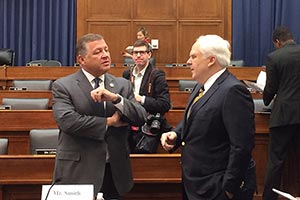Senior Reporter
FedEx Touts Twin 33s at House Hearing on Infrastructure

WASHINGTON — Allowing the freight industry to rely on twin 33-foot trailers nationwide would enhance productivity, safety and environmental efficiency, FedEx Corp.’s chief executive told a House transportation panel Feb. 1.
“In several years of operations in Florida and elsewhere, FedEx drivers have told us repeatedly that they find them to be more stable,” Chairman and CEO Fred Smith said in prepared remarks before the House Transportation and Infrastructure Committee. “Safety will be enhanced simply by reducing the trips and mileage driven, with industry estimates of 1.3 billion fewer miles driven.”
A nationwide adoption of the longer combination trailers — from 28 feet to 33 feet — would not represent an increase in gross vehicle weight, and it would allow carriers to increase the volume of shipments carried up to 18%, before tacking on incremental trips, Smith said. He also noted longer trailers would reduce CO2 emissions by 4.4 billion pounds of carbon, resulting in savings of more than 200 million gallons of fuel annually.
RELATED: FedEx founder Fred Smith believes twin 33s will win approval
Committee Chairman Bill Shuster (R-Pa.) said he was receptive to Smith’s proposal, but he did not say if he intends to propose authorizing the trailers in a highway policy bill.
“I think it’s something that is safe. They utilize it today, and it increases the capacity without adding a single lane to the highways,” Shuster told reporters after the hearing.
Last month, FedEx Corp. announced it had joined Americans for Modern Transportation, a coalition of shippers and retailers that plans to urge Congress to support the nationwide access of the trailers. The coalition includes UPS Inc. and Amazon.com. Twenty-eight feet is the allowable length for trailers nationwide absent special permits.
“We need to lay the groundwork for a modern transportation system,” the coalition wrote. “Central to this goal is combining infrastructure enhancements with efficient trucking and policies as well as incentives for better safety and fuel technology.”
FedEx ranks No. 2 on the Transport Topics Top 100 list of the largest U.S. and Canadian for-hire carriers. UPS ranks No. 1.
Opponents suggest motorists unfamiliar with the longer trailers on roadways would find them problematic on their commutes.

